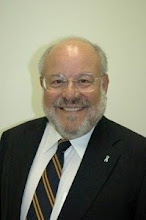The year 2007 was a rough one for me—having undergone a terrible fall, skidding on a pebble-strewn brick apron of a driveway and tearing through the quadriceps muscles and tendons of my left leg. I had to have a major operation and then have had what a professor colleague of mine at the State University of New York called an “empathy experience.”
It was more than a month in a wheelchair. I’ve never thought much about the ramps and big buttons that open doors for folks in wheelchairs and other needed “accessibility” provisions now widespread due to the Americans with Disability Act.
Among the most difficult things: getting into bed or, yet more difficult, out, or struggling to take a shower with a plastic leaf bag over the cast and entire leg to keep things dry. I learned the ways disabled people have to traverse: using elevators and ramps. Bannisters, wow are they important to hold on to. And those slopes in sidewalks. When you are in a wheelchair, you look carefully for those slopes. Then I went to crutches and finally a cane.
I’ve been receiving physical therapy at Manual Sports & Physical Therapy, the wonderful place of Sinead FitzGibbon and her protégés, in the community where I live, Sag Harbor, New York. Sinead is a master at getting folks with broken bones and torn muscles and tendons back into shape.
In another lesson in what disabled and sick people face—more emphathy experience—it didn't take long before I was denied further physical therapy by my health insurer, Managed Physical Network. “Your condition,” it asserted in a letter, “has stabilized.”
I couldn't—and still can't—get up and down stairs well. I needed—and still need—more therapy.
After Sinead and I protested, Managed Physical Network gave permission for eight more treatments. After that, there's no commitment for anything more.
Nick Daba, my lead therapist at Manual Sports, had a premonition it could happen. As he treated me three weeks ago in what the health insurer would have had as my last session, he was telling me of the former CEO of United HealthCare receiving a stock option bonus in excess of a billion dollars last year in addition to his multi-million dollar salary. Back home, I confirmed that on Google.
The health insurance companies clearly like to deny people care. How else can their executives rake in millions and more for themselves?
A superb and comprehensive report on the situation has just been done at Sonoma State University: "Practices in Health Care and Disability Insurance: Delay, Diminish, Deny, and Blame" by Peter Phillips and Bridget Thoraton. Check it out at:
http://www.projectcensored.org/HCDI_1007.pdf
The authors note in their announcement of the study that it “shows how health and disability insurance companies are systematically cheating the American public.”
Importantly, it shows why. “As some of the richest most powerful people in America, health care executives dominate health policy with their campaign donations and active lobbying efforts,” Professor Phillips and Ms. Thoraton say. “They spend millions to keep themselves in the health insurance delivery business despite overwhelming evidence that we would all be better off without them. They use these profits to propagandize the American public and influence voters through scare tactics of ‘socialized medicine’ and long delays of service in single-payer systems.”
The report concludes: “Adequate health care for everyone is a human right, acknowledged by the world in the 1948 United Nations’ Declaration of Human Rights. Most Americans pay higher combined taxes, health and disability insurance premiums, co-payments, and various health-related expenses than citizens in common pool, single-payer systems, yet those countries allow all their citizens equal access to services.” (The report, citing a New England Journal of Medicine analysis, relates that spending for administrative costs associated with health care in the U.S. amounts to more than $320 billion a year or 31 percent overall, while the administrative costs in the Canadian national healthcare system totals 16.7 percent.) “When the American people,” says the report, “collectively decide that health care and basic social security is a right which belongs to everyone, the health and disability system can be changed to provide necessary benefits for all.”
The authors declare: “People in the U.S. have a choice. We can continue with a high-cost profit-driven private insurance health care system leaving million to languish without care, and millions more to face the frustrations of systematic delays, diminished care, and denials of promised benefits. Alternatively, we can build a common pool health care system that provides necessary health care goods to everyone—for less than what we are now paying. Let’s find and support the politicians who will provide health care for all outside of corporate fat-cat control.”
My "empathy experience" has been minor compared to the horrific ordeals of millions of Americans under a predatory and thoroughly outrageous "health care" system.
Subscribe to:
Post Comments (Atom)


1 comment:
www.empathyexperience.com
Post a Comment